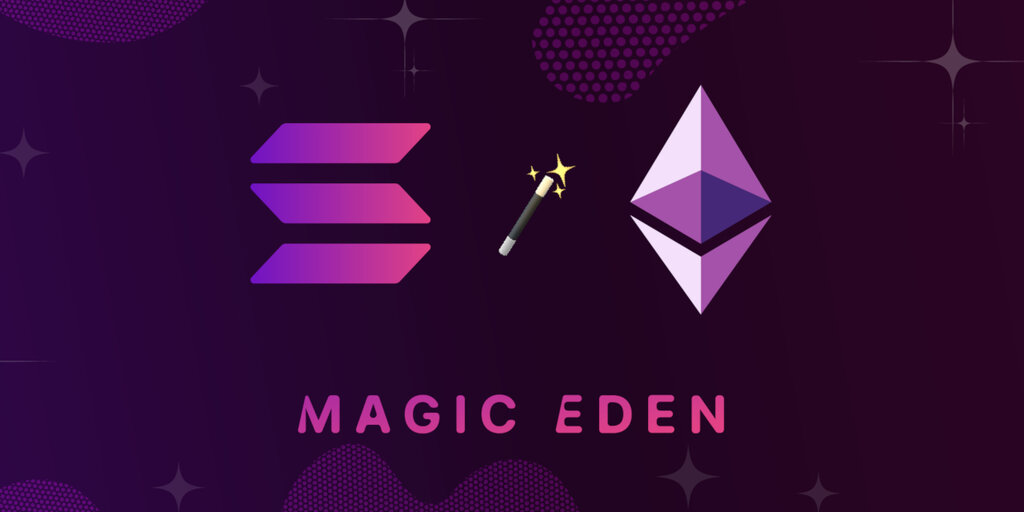Menu
Search
About
Alongside an announcement of fresh VC funding in June that valued the startup at $1.6 billion, top Solana NFT marketplace Magic Eden said that it would explore multi-chain expansion in the coming months. Now we know that it’ll take on the biggest NFT market first: Ethereum.
Magic Eden today confirmed that its next blockchain addition will indeed be Ethereum, the network that hosts the vast majority of the most popular NFT collections and projects—and by far the largest market for NFT trading by volume.
Unlike with Solana, Magic Eden will aggregate Ethereum NFT listings from other marketplaces, with a representative telling Decrypt that it would be a "pure aggregator" on Ethereum with "no proprietary listings." That means that listed NFTs won't be held in escrow, which is currently the case for Magic Eden's Solana NFTs.
During the month of August, Magic Eden will begin rolling out Ethereum NFT support across its platform, including its launchpad (used to mint, or create, new NFT projects), its new list tool that lets projects create an “allowlist” of users for NFT mints, and its drop calendar that highlights notable upcoming NFT collectible launches.
The launchpad will add Ethereum support starting with EZU, a new profile picture project from the creators of Psychedelics Anonymous. Beyond those initial steps, Magic Eden will also conduct cross-currency trading tests that enable the purchase of Solana or Ethereum NFTs using ETH, SOL, or a credit card. Magic Eden plans to add multi-chain analytics tools as well.
An NFT is a blockchain token that can represent ownership in an item, such as digital goods including profile pictures, artwork, and collectibles. The NFT market exploded in popularity last year, generating $25 billion worth of trading volume, per DappRadar.
Ethereum and its various sidechain and layer-2 networks commanded the vast majority of that tally and that trend has continued into 2022. The platform plays host to notable projects like the Bored Ape Yacht Club, CryptoPunks, Art Blocks, and Axie Infinity, among others.
To? pic.twitter.com/jyplmcukY3
— Magic Eden 🪄 (@MagicEden) August 1, 2022
However, Solana has emerged as a rising alternative network for NFTs, with lower fees, faster transactions, and less of an environmental impact than Ethereum at present (though a forthcoming upgrade to Ethereum could change this dramatically). Notable projects like Solana Monkey Business, Okay Bears, and DeGods have emerged on Solana since late last year, with over $2.5 billion worth of Solana NFT trading volume to date, per CryptoSlam.
Magic Eden is currently the biggest player in the Solana space, consistently commanding 90% or more of trading volume, even as OpenSea—the leading Ethereum marketplace—added Solana support in April. Now Magic Eden is expanding onto OpenSea’s turf in kind.
OpenSea and Magic Eden have routinely traded barbs on social media. Just recently, OpenSea has ratcheted up criticism of Magic Eden’s escrow-based trading model, in which the marketplace takes custody of sellers’ NFTs when the assets are listed on the platform. Criticism over the model has grown within the Solana NFT community of late.
In return, Magic Eden has prodded OpenSea about the “inactive listings” situation it encountered earlier this year, in which some users’ valuable Ethereum NFTs were sold for below-market prices due to a UI issue. OpenSea ultimately refunded affected users with $1.8 million worth of ETH, although one collector sued the marketplace over the problem.
With both marketplaces about to contend on both the Ethereum and Solana fronts going forward, we’ll see whether the multi-chain sales competition ultimately matches the fevered rhetoric.

